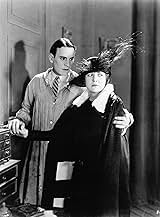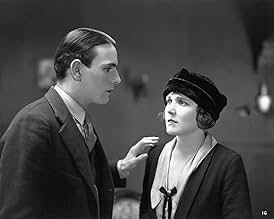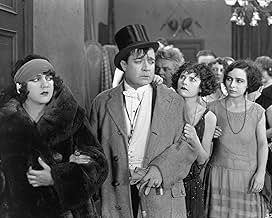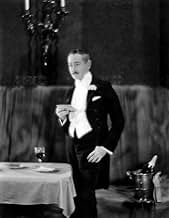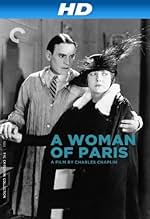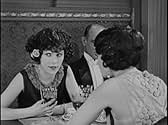IMDb RATING
6.9/10
6.6K
YOUR RATING
A kept woman runs into her former fiancé and finds herself torn between love and comfort.A kept woman runs into her former fiancé and finds herself torn between love and comfort.A kept woman runs into her former fiancé and finds herself torn between love and comfort.
- Awards
- 3 wins total
Charles K. French
- Jean's Father
- (as Charles French)
Nellie Bly Baker
- Masseuse
- (uncredited)
Henry Bergman
- Head Waiter
- (uncredited)
Charles Chaplin
- Station Porter
- (uncredited)
Frank Coghlan Jr.
- Boy
- (uncredited)
Antonio Corsi
- Accordion Player
- (uncredited)
Harry d'Abbadie d'Arrast
- Man in Nightclub
- (uncredited)
Stella De Lanti
- Revel's Fiancée
- (unconfirmed)
- (uncredited)
Jean de Limur
- Man in Nightclub
- (uncredited)
Charles Farrell
- Man in Nightclub
- (uncredited)
Bess Flowers
- Mannequin
- (uncredited)
- Director
- Writer
- All cast & crew
- Production, box office & more at IMDbPro
Featured reviews
A Woman Of Paris was an acclaimed success with the critics when it was Originally released on 1st October 1923. However, the audience despised it as they wanted to see Charlie Chaplin the tramp starring in a film not a film directed by Chaplin in which he does not appear (albeit in a small cameo role). When i first saw the film on BBC2 around Christmas 1998 i thought Chaplin had a starring role so was naturally disappointed when i found out this wasn't the case. However, since then i have become a huge fan of Chaplin and all his work so now I think this film is rated among Chaplin's best features. His musical score composed in 1976 with Eric Rogers was Chaplin's last ever work in his film career which spanned 62 years. By 1976 Chaplin was very frail and struggled to communicate so the fact that he could compose the music for a near 80 minute film is amazing and the fact that the music score is as good as any of his other films is also astonishing. Charles Chaplin was a true genius of Cinema and A Woman Of Paris is an excellent example of Chaplin as director, writer and composer.
This is an exquisite film that needs to be seen with some understanding of the era in which it was made. It was a critical success for good reason, and it's ironic style and subtle acting was a great influence on directors such as Lubitsch. It was not a popular success in the US but was well understood and acclaimed as such in Europe. I notice that some reviewers decry it as melodrama, but there is no reason why melodrama should not be an acceptable form of art. I would urge viewers to immerse themselves more in the treasures of the silent cinematic era, as there are many lessons to be learned therefrom for today's aspiring artists in any medium.
A melodrama rather than the saucy Parisian comedy the title and the name of Charles Chaplin suggests. Promptly withdrawn by its creator, 'A Woman of Paris' was for over half a century one of those films whose reputation was based upon it's unavailability for reappraisal and like many of Chaplin's later films was to prove a disappointment when it was finally revived in the 1970s.
Both the plot and the wardrobe worn by Chaplin's leading lady Edna Purviance evokes the era of Chaplin's fellow United Artist D. W. Griffith rather than the continental sophistication suggested by the title, while the presence of Adolphe Menjou happily anticipates the nascent sophistication of the twenties.
Both the plot and the wardrobe worn by Chaplin's leading lady Edna Purviance evokes the era of Chaplin's fellow United Artist D. W. Griffith rather than the continental sophistication suggested by the title, while the presence of Adolphe Menjou happily anticipates the nascent sophistication of the twenties.
Charles Chaplin is noted for his comedy performances, and deservedly.
His direction, though, should be more highly regarded, if only for this one motion picture.
Compare the quality of the photography and the smoothness of the editing to, for example, "The Gold Rush," of about the same time.
"A Woman of Paris" is very modern; "The Gold Rush" is downright primitive (but, in spots, brilliant).
"A Woman of Paris" also shows some admirable acting talent in, really, all the players. Some of the lesser characters are still played beautifully, despite being "lesser," especially Marie's maids and her, more or less, friends, and very especially the masseuse.
And the scene where the artist's mother, played by Lydia Knott, bent on revenge, comes upon Marie -- with no words, just body movement and facial expression -- she tells the audience what the proverbial thousand words could not so well.
Credit for part of that good acting must, of course, go to the director, but even the best director can't make much of poor actors.
Chaplin had very good actors. Adolphe Menjou reached stardom, and deservedly. What a tremendous talent; he could do everything.
Edna Purviance should have achieved much more acclaim. She performed admirably, especially in this movie, and she was attractive. Fame is certainly fickle.
In some ways, "A Woman of Paris" might be written off by a few as "soap opera." But it is well worth watching for the performances and, especially, for the directing.
His direction, though, should be more highly regarded, if only for this one motion picture.
Compare the quality of the photography and the smoothness of the editing to, for example, "The Gold Rush," of about the same time.
"A Woman of Paris" is very modern; "The Gold Rush" is downright primitive (but, in spots, brilliant).
"A Woman of Paris" also shows some admirable acting talent in, really, all the players. Some of the lesser characters are still played beautifully, despite being "lesser," especially Marie's maids and her, more or less, friends, and very especially the masseuse.
And the scene where the artist's mother, played by Lydia Knott, bent on revenge, comes upon Marie -- with no words, just body movement and facial expression -- she tells the audience what the proverbial thousand words could not so well.
Credit for part of that good acting must, of course, go to the director, but even the best director can't make much of poor actors.
Chaplin had very good actors. Adolphe Menjou reached stardom, and deservedly. What a tremendous talent; he could do everything.
Edna Purviance should have achieved much more acclaim. She performed admirably, especially in this movie, and she was attractive. Fame is certainly fickle.
In some ways, "A Woman of Paris" might be written off by a few as "soap opera." But it is well worth watching for the performances and, especially, for the directing.
Fans of Charlie Chaplin flocked to the theaters anticipating a good laugh in his next film, September 1923's "A Woman In Paris." Despite a disclaimer in the beginning of the movie that this was a serious drama, viewers paying to see a comedy were dismayed and disappointed by it. But movie critics loved it, praising its subtleties and emotional depth. As writer David Robinson stated, "Chaplin inaugurated a whole new style of comedy of manners, and new styles of acting to suit it...by revealing the inner workings of his characters' hearts and minds through their external actions and expressions."
Chaplin felt that his regular comedic sidekick, Edna Purviance, who appeared in over 30 of his films since 1915, was becoming too mature of an actress to continue doing slapstick. He wanted to feature her in a serious, dramatic role to illustrate her expressive and sincere yet sober acting abilities. Gleaming a story idea from one of the country's most gold-digging of multi-millionaire wives, Peggy Hopkins Joyce, Chaplin formulated a story on a woman who leaves for Paris on a train after her supposed fiancee doesn't show up at the platform. Marie (Purviance) hooks up with a rich businessman, Pierre (Adolphe Menjou), and lives the life of luxury, until she meets up with her former fiancee. A suicide spices up Chaplin's plot, all derived from Joyce's own personal experiences. The comedian at the time was having a fling with this most interesting Virginian-born woman, Peggy Joyce, whose fangs dug into six very lucrative marriages. She was famous for quotes such as "True love was a heavy diamond bracelet, preferably one that arrived with its price tag intact."
Once the public realized the movie was all serious and lacked a Chaplin presence (he did have a short cameo as a train porter), the chairs in the theaters playing it became empty. Chaplin was forced to pull "A Woman In Paris" prematurely, which, being his first film for his co-ownershipped United Artists, hit the company's bottom line.
Chaplin's original desire to launch a new direction for Purviance fell flat. Not only was the film a failure at the box office, but a New Year's Day incident of 1924 involving a male friend put a crimp on her future acting ambitions. Attending an intimate gathering of three at oil magnate Courtland Dines' apartment with actress Mabel Normand, Purviance witnessed chauffeur Horace Greer (alias Joe Kelley) arrival to pick up Mabel. Conflicting accounts were given as to what happened next: either Greer saw something that hinted Dines being caught in the act with Mabel, or the host unexplicably approaching him angerly waving a wine bottle. Whatever happened, the chauffeur shot Dines three times. Purviance went to the wounded Dines assistance, and for the next 90 minutes tried to staunch the wounds in his bed. Greer drove to the police station to give himself up while the two actresses finally called an ambulance. With Dines refusing to testify during the trial, the jury came back with a not guilty verdict.
The scandal, with all the rumors filling in the blanks, basically slowed Purviance's career to a crawl. She was in one other Chaplin film, 'A Woman of the Sea,' which the unhappy director destroyed, and a 1927 French film. Her two uncredited parts in Chaplin's later movies were her swan songs of the secretary who turned into a movie actress. She received a small monthly salary from Chaplin for the remainder of her life. When she passed away in 1958 at 62, Chaplin, who appeared in over 30 movies with the actress, said "How could I forget Edna? She was with me when it all began."
Chaplin felt that his regular comedic sidekick, Edna Purviance, who appeared in over 30 of his films since 1915, was becoming too mature of an actress to continue doing slapstick. He wanted to feature her in a serious, dramatic role to illustrate her expressive and sincere yet sober acting abilities. Gleaming a story idea from one of the country's most gold-digging of multi-millionaire wives, Peggy Hopkins Joyce, Chaplin formulated a story on a woman who leaves for Paris on a train after her supposed fiancee doesn't show up at the platform. Marie (Purviance) hooks up with a rich businessman, Pierre (Adolphe Menjou), and lives the life of luxury, until she meets up with her former fiancee. A suicide spices up Chaplin's plot, all derived from Joyce's own personal experiences. The comedian at the time was having a fling with this most interesting Virginian-born woman, Peggy Joyce, whose fangs dug into six very lucrative marriages. She was famous for quotes such as "True love was a heavy diamond bracelet, preferably one that arrived with its price tag intact."
Once the public realized the movie was all serious and lacked a Chaplin presence (he did have a short cameo as a train porter), the chairs in the theaters playing it became empty. Chaplin was forced to pull "A Woman In Paris" prematurely, which, being his first film for his co-ownershipped United Artists, hit the company's bottom line.
Chaplin's original desire to launch a new direction for Purviance fell flat. Not only was the film a failure at the box office, but a New Year's Day incident of 1924 involving a male friend put a crimp on her future acting ambitions. Attending an intimate gathering of three at oil magnate Courtland Dines' apartment with actress Mabel Normand, Purviance witnessed chauffeur Horace Greer (alias Joe Kelley) arrival to pick up Mabel. Conflicting accounts were given as to what happened next: either Greer saw something that hinted Dines being caught in the act with Mabel, or the host unexplicably approaching him angerly waving a wine bottle. Whatever happened, the chauffeur shot Dines three times. Purviance went to the wounded Dines assistance, and for the next 90 minutes tried to staunch the wounds in his bed. Greer drove to the police station to give himself up while the two actresses finally called an ambulance. With Dines refusing to testify during the trial, the jury came back with a not guilty verdict.
The scandal, with all the rumors filling in the blanks, basically slowed Purviance's career to a crawl. She was in one other Chaplin film, 'A Woman of the Sea,' which the unhappy director destroyed, and a 1927 French film. Her two uncredited parts in Chaplin's later movies were her swan songs of the secretary who turned into a movie actress. She received a small monthly salary from Chaplin for the remainder of her life. When she passed away in 1958 at 62, Chaplin, who appeared in over 30 movies with the actress, said "How could I forget Edna? She was with me when it all began."
Did you know
- TriviaThe reissue of this film, with a musical score and new cut by Sir Charles Chaplin, was the last work of his entire film career. By then, the 87-year-old Chaplin was visibly frail but still walking. His score was aided by arranger Eric James, and he took a small theme from Monsieur Verdoux (1947), but most of the score was Chaplin's. The film was reissued posthumously in 1977 with the new score to overwhelming critical and public praise. At that time, many critics praised it (as in the trailer) as one of the best films ever made.
- GoofsWhen Jean starts fighting with Pierre in the restaurant, Pierre's glass of wine or champagne gets knocked over. When Pierre sits down on the table afterwards, the glass stands on the table filled with drink as if it hadn't been knocked over.
- Quotes
[Intertitle]: Time heals, and experience teaches that the secret of happiness is in service to others.
- Alternate versionsDuring 1976, Chaplin was preparing a reissue of A Woman of Paris/Sunnyside but died before completion. The project was completed after his death, and the films were reissued in the United States by Kino International Corp. in 1978. This version, however, dispensed with an opening subtitle, as well as a few brief insert shots.
- ConnectionsFeatured in Chaplin Today: Modern Times (2003)
- How long is A Woman of Paris: A Drama of Fate?Powered by Alexa
Details
- Release date
- Country of origin
- Official site
- Language
- Also known as
- Una mujer de París
- Filming locations
- Production company
- See more company credits at IMDbPro
Box office
- Budget
- $351,000 (estimated)
- Gross worldwide
- $12,921
- Runtime1 hour 22 minutes
- Sound mix
- Aspect ratio
- 1.33 : 1
Contribute to this page
Suggest an edit or add missing content

Top Gap
By what name was A Woman of Paris: A Drama of Fate (1923) officially released in India in English?
Answer
